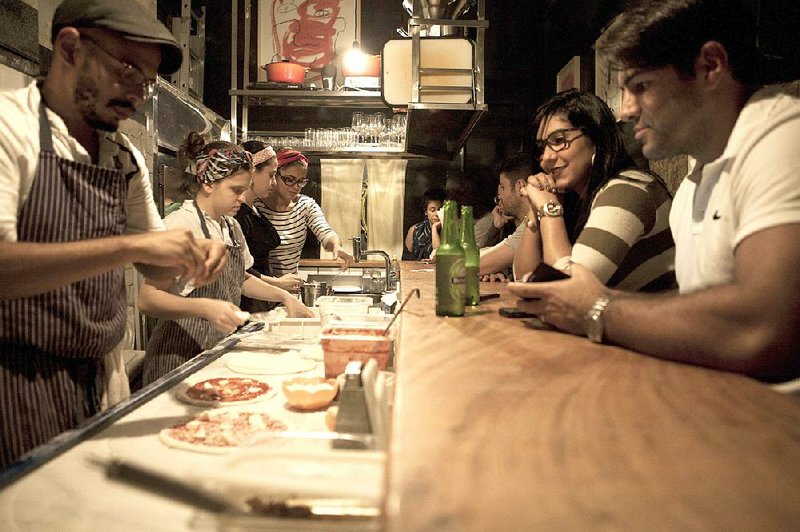Sei Shiroma is, frankly, a tiny player in Brazil's $2 trillion economy. A 29-year-old immigrant from New York, he runs a pizzeria out of the ground floor of an old apartment building near downtown Rio de Janeiro. The place seats, when tightly packed, maybe 10 people.
But Shiroma's saga as an aspiring entrepreneur, and the bitter attitude it instilled in him, underscore one of the great ills plaguing Latin America's biggest economy. It can be excruciatingly painful to open -- and then operate -- a business in Brazil.
Shiroma refers to the months he spent last year supervising construction and tracking down documents needed to open the restaurant as the worst time of his life. And then he delivers a damning verdict: When he expands his business, he may go somewhere in Europe rather than trying to open another pizzeria in Brazil.
"I'm still recuperating emotionally," Shiroma says.
While Brazil's long slide into its worst recession in 25 years has any number of high-profile causes -- from ballooning federal debt to the corruption scandal paralyzing the oil industry -- the government's inability to untangle this bureaucratic mess is a key factor too, acting as an impediment to investment. It is one of the many structural reforms the country failed to address during the boom years of the previous decade, when soaring prices for its commodity exports papered over the gaping holes in the economy.
In the World Bank's "Doing Business 2015" list, Brazil ranks 120th out of 189 countries. That puts it behind nations like Nicaragua, Swaziland and Lebanon. It takes 103 days to open a business in Sao Paulo, the study shows. In Mexico City, it takes six days. Four in New York City. Getting a construction permit, meanwhile, can take 400 days in Sao Paulo, more than four times the wait in Mexico City and New York.
That red tape has consequences: In 2013, investment equaled just 18 percent of Brazil's gross domestic product, the lowest rate among the biggest developing economies and less than half that of China's, according to the World Bank.
At the heart of Brazil's bureaucracy is the network of more than 13,000 notary shops -- "cartorios" in Portuguese -- that have to sign off on everything from birth certificates to real estate transactions.
Shiroma would quickly get entangled in their web.
He arrived in Rio in late 2012, a year after meeting a Brazilian graduate student who would become his wife. Cooking was in Shiroma's blood, having spent much of his youth in his parents' Japanese restaurant in midtown Manhattan and then landing a job making pizzas at an Italian place called Barboncino in Brooklyn.
He decided to apply those skills on the streets of Rio, designing a mobile oven that he'd set up at different spots. When he requested a street vendor's license, city officials said they had none to issue, and sent him off with some advice: Just don't get caught.
That became harder as Shiroma's pizzas -- topped with everything from garlic confit to collard greens -- became popular. Real popular. Patrons started lining up 30 minutes in advance, and with the crowds came extra attention. Rio police shut him down several times. It was time to find a more formal setup.
At first, Shiroma tried to tackle the paperwork for his restaurant on his own, leaning on his in-laws for help. But, as far as he could tell, the required documents kept changing depending on who he was dealing with at government agencies and notaries. Frustrated, he hired what's known in Brazil as a "fixer," a service that helps navigate the red tape.
"Initially, I thought it was semi-illegal," Shiroma, decked out in black-rimmed glasses and sporting a goatee, said while sipping coffee in Rio last month. "But I've come to realize it's just a cultural thing."
As bad as the bureaucracy is now, it's better than it was. A 2006 reform lets the nation's small businesses pay their taxes with a single form. And while the number of procedures to start a new venture is among the highest of the G-20 nations, it's getting cheaper, with the cost now below that of the group's average, consultant Ernst & Young LLP said in a 2013 report.
Shiroma's Ferro & Farinha -- or "Iron & Flour" translated from Portuguese -- opened some two months behind schedule in late November. On a recent evening, he was manning the oven as patrons squeezed together at the L-shaped bar or sat outside at plastic tables. Several more waited out front.
Shiroma said he felt a huge relief the day he welcomed his first clients to the restaurant. "Gratifying would be short- selling it," he said. "I almost didn't want to live during construction."
Anna Edgerton of Bloomberg News contributed to this report.
SundayMonday Business on 07/12/2015

